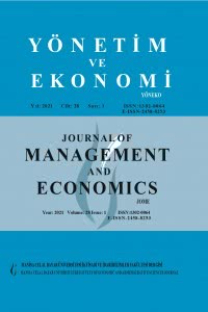Bireycilik ve Yeni Kariyer Yönelimleri
Bu araştırma lisansüstü öğrenim gören öğrencilerin bireycilik değerleri ile tercih ettikleri kariyer yönelimleri arasındaki ilişkiyi incelemektedir. Araştırma için bireycilik, dikey ve yatay olarak iki boyutlu ele alınmıştır. Yeni kariyer yönelimleri ise, sınırsız ve çok yönlü kariyer şeklinde araştırılmıştır. Dikey bireycilik değerleri ile sınırsız kariyer zihniyeti ve yatay bireycilik ile özyönetimli kariyer pozitif yönde ilişkili bulunmuştur. Regresyon analizi sonucunda, bireycilik değerlerinin, değer odaklı kariyer yönelimini önemli ölçüde açıkladığı tespit edilmiştir
Anahtar Kelimeler:
Bireycilik, Çok Yönlü Kariyer, Sınırsız Kariyer
Bireycilik ve Yeni Kariyer Yönelimleri
___
AGARWALA, Tanuja (2008), “Factors influencing career choice of management students in India”, Career Development International, 13(4), 362-376.ARTHUR, Michael B., ve Denise M. ROUSSEAU (1996), The Boundaryless Career: A New Employment Principle For a New Organizational Era, New York: Oxford University Press.
AYTAÇ, Serpil (1997), Çalışma Yaşamında Kariyer, Bursa: Ezgi Kitabevi.
BRISCOE, Jon P., HALL, Douglas T. ve Rachel L. DEMUTH (2006), “Protean and Boundaryless Careers: An Empirical Exploration”, Journal of Vocational Behavior, 69(1), 30-47.
BROWN, Duane (2002), “The Role of Work and Cultural Values in Occupational Choice, Satisfaction, and Success: A Theoretical Statement”, Journal of Counseling & Development, 80(1), 48-56.
DANNY, Françoise, MALLON, Mary, ve Michael ARTHUR (2003), “The odyssey of career and the opportunity for international comparison”, The International Journal of Human Resource Management, 14(5), 705-712.
DEMİRBİLEK, Tunç (1994), “Örgütlerde Kariyer Danışmanlığı Hizmetleri”, Dokuz Eylül Üniversitesi İktisadi İdari Bilimler Fakültesi Dergisi, 9(2), 71-85.
FINKELSTEIN, Marcia A. (2010), “Individualism/collectivism: ImplicatIons for the volunteer process”, Social Behavior and Personality, 38(4), 445-452.
GRANROSE, Cherlyn S. (2007), “Gender differences in career perceptions in the People's Republic of China”, International Journal of Career Management, 12(1), 9-27.
GREENHAUS, Jeffrey ve Gerard A. CALLANAN, (2006), Encyclopedia of Career Development, Thousand Oaks:Sage Publications
HALL, Douglas T. (2002), Careers in and out of Organizations, Thousand Oaks: Sage Publications.
KATS, Merel M. S., VAN EMMERIK, I. J. Hetty, BLENKINSOPP, John ve Svetlana N. KHAPOVA (2010), “Exploring the associations of culture with careers and the mediating role of HR practices: A conceptual model”, Career Development International, 15(4), 401-418.
MALACH-PINES, Ayala ve Oshrit KASPI-BARUCH, (2007), “Culture and gender in the career choice of aspiring managers and entrepreneurs”, M.F. Özbilgin ve A. Malach-Pines (der.), Career Choice in Management and Entrepreneurship: A Research Companion içinde, Cheltenham: Edward Elgar, 51-74.
MALACH-PINES, Ayala ve Oshrit KASPI-BARUCH, (2008), “The role of culture and gender in the choice of a career in management” Career Development International, 13(4), 306- 319.
MCCARTHY, John (2005), “Individualism and Collectivism: What Do They Have to Do with Counseling?”, Journal of Multicultural Counseling and Development, 33(2), 108-117.
NG, Eddy S.W., BURKE, Roland J. ve Lisa FIKSENBAUM (2008), “Career choice in management: findings from US MBA students”, Career Development International, 13(4), 346-361.
OYSERMAN, Daphna, COON, Heather M. ve Markus KEMMELMEIER (2002), “Rethinking Individualism and Collectivism:Evaluation of Theoretical Assumptions and Meta- Analyses”, Psychological Bulletin, 128(1), 3–72.
ÖZBİLGİN, Mustafa F., KÜSKÜ, Fatma ve Nihat ERDOĞMUŞ (2005), “Explaining influences on career ‘choice’: the case of MBA students in comparative perspective”, International Journal of Human Resource Management, 16(11), 2000-2028.
PANG, Mary, CHUA, Bee-Leng ve Chris W.L. CHU (2008), “Learning to Stay Ahead in an Uncertain Environment”, International Journal of Human Resource Management, 19(7), 1383-1394.
RAMAMOORTHY, Nagarajan ve Stephen J. CARROLL (1998), “Individualism/Collectivism Orientations and Reactions Toward Alternative Human Resource Management Practices”, Human Relations, 51(5), 571-588.
ROBERTS, Brent. W. ve HELSON, Ravenna. (1997), “Changes in culture, changes in personality: the influence of individualism in a longitudinal study of women” Journal of Personality and Social Psychology, 72(3), 641-651.
SEÇER, Barış (2007), Kariyer Sermayesi ve İstihdam Edilebilirliğin İş Güvencesizliği Üzerindeki Etkisi, Yayınlanmamış Doktora Tezi, Dokuz Eylül Üniversitesi, Sosyal Bilimler Enstitüsü.
SONG, Lyinda J. ve James D. WERBEL (2007), “Guanxi as impetus? Career exploration in China and the United States”, International Journal of Career Management, 12(1), 51-67.
TRIANDIS Harry C. ve Eunkook M. SUH (2002), “Cultural influences on personality”, Annual Review of Psychology, 53, 133-160.
TRIANDIS Harry C. ve Michele GELFAND (1998), “Converging Measurement of Horizontal and Vertical Individualism and Collectivism”, Journal of Personality and Social Psychology, 74(1), 118-128.
WASTI, Arzu S. ve Selin E. ERDİL (2007), “Bireycilik Ve Toplulukçuluk Değerlerinin Ölçülmesi: Benlik Kurgusu ve INDCOL Ölçeklerinin Türkçe Geçerlemesi”, Yönetim Araştırmaları Dergisi ,7, 39-66.
- ISSN: 1302-0064
- Yayın Aralığı: Yılda 4 Sayı
- Yayıncı: Manisa Celal Bayar Üniversitesi İktisadi ve İdari Bilimler Fakültesi
Sayıdaki Diğer Makaleler
Türkiye’de Banka Kredi Kanalının İşleyişi: Ampirik Bir Analiz
Osman PEKER, Birgül CANBAZOĞLU
Müzakere Sürecinde Türkiye’ye Yönelik Avrupa Birliği Mali Yardımları: Taahhütler ve Gerçekleşmeler
Sibel MEHTER AYKIN, Kemal GÜRSOY
Bürokrasi-Demokrasi İlişkisi ve Bürokratların Seçilmişlerce Kontrolü Sorunu
Die entwicklung des privatkredits und die rolle des risikomanagements
Zeynep KARAÇOR, Taha Bahadır SARAÇ
Bireycilik ve Yeni Kariyer Yönelimleri
Kamu Harcamaları ve Ekonomik Büyüme İlişkisi: Türkiye’ye İlişkin Ampirik Kanıtlar
Kadrosuz Usta Öğreticilerin Sosyal Güvenlik Hakları
Basel II Sürecinde Kredi Derecelendirme ve Bir Tekstil İşletmesinde Uygulaması
